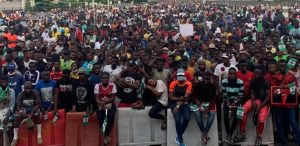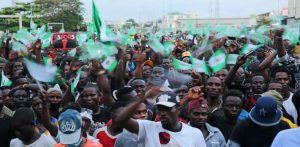As soon as I ended the call from the hospital, I did not spare a moment to think of the implication of my subsequent actions. All I hankered for was to rush to the hospital and dish out a piece of my mind to the doctors at the hospital and whoever cared to listen.
Papa was in a bad shape; the tumor was spreading like wildfire. It was just not logical to discharge him, at least, not yet. We sold almost everything to raise money for his treatment. Our expectation was to return home with a healthy father or at worst, a better looking father.
In anger, I rushed to the room picked the small umbrella behind the door, shoved it under my wet armpit, and dashed out. I walked as fast as my feeble feet could carry me. The umbrella came in handy when the sun grew unfriendly. Taking a taxi or a bus that moment was a luxury I could not afford; it was not even an option to be considered. We were broke, miserable, and plagued. I caught myself twice voicing my woes into the thin air as I journeyed to the hospital. Bystanders must have mistaken me for retarded girl burdened by the sorrows of life, and they won’t be far from the truth.
I arrived the hospital sweaty-faced, dusty feet, and my worn-out gown glued to my wet body. All my rants fell on deaf ears as no one bothered to look my way. I felt stupid after the janitor narrated how the poor citizens were forced to vacate the private wards to create room for significant citizens of the country who were sick and could not go aboard for medical vacation because of the corona virus outbreak. It sounded untrue to my ears but true to my heart. It became obvious to me that it was our turn to be served the hot bowl of injustice.
I accepted the fate before us bit by bit until I could no longer feel its crushing weight. The pains in Papa’s eyes killed me a million and two times to the degree that I craved my own tears. I placed a call across to uncle Dabo who grudgingly showed up ten minutes later.
We were on our way home when we heard the announcement of the one-week lockdown due to the continuous spread of the virus. Uncle hissed and hauled curses on the government. He was more worried about his business than he was of papa’s condition.
The following week was unbearable for us because papa’s flesh began to waste. He would curl his body in unimaginable shapes, maybe, to release the pain into the atmosphere. The pains glued his tongue to the roof of his mouth: he could not eat, drink, or speak. When he couldn’t bear it anymore, he transitioned to glory in his sleep that Sunday morning. We wailed, but no one showed up. We grieved, but no one cared. We were forced to bury him in a shallow grave we dug at a corner in the compound later that day.
*
It was hunger that first pushed us to join the ENDSARS protest the next week. But as soon as we found food, a reason or maybe an opportunity showed up for us to fight the injustice, spewed at us, that led papa to the grave.
The new friends I made on the protest ground all had their tales of horror. Their tales of horror clustered around my chest making it extremely difficult for me breathe at some point. These tales folded their claws around my intestines like a dark Owl of the North feasting on its prey. My stomach soon began to rumble in fear. I was scared for my life. I was scared of becoming rich or famous. I was terrified by the thought of being shot by an officer for looking good or owing an item of luxury.
While on the street, we were kneaded by our desire to demand a better tomorrow. We were united by our fears and pains, but we were oblivious of the fact that the day of doom was nigh.

In a cruel twist of fate, the atmosphere changed that afternoon; it became cloudy and too breezy for comfort. The strange but familiar atmosphere got us throwing gazes at the sky hoping to catch a glimpse of whatever was about to descend. Our eyes failed us, but our nostrils were favoured to pick the stench of decayed cadavers in warm blood floating in the air. Our nostrils picked the stench of death even before its bearers appeared.
We saw them from a distance, kitted and decorated in their unmistaken regalia. At that point, it was difficult to convince our feeble minds that another holocaust was not about to happen.
My heart jumped out of my body but quickly rushed back in to watch from within as events unfold. Within split second, the protesters had formed a cluster as thick as the cloud above us. Fear hovered above our heads and subdued us to silence. The man leading the brigade of armed men ordered us to disperse, but our numbed legs couldn’t even move. I was certain that any attempt to run or even move a limb would result in a stampede.
It was a battle; our world against theirs, a matter of life and death. Death was staring at us in the face: she, he, or it was just a trigger away. The tension grew and heartbeats became deafening. The awkwardness forced them to retreat for few minutes.
Then Dayo, my new friend, spoke up with his chest moving in an unusual but visible way. ‘I grew up in the barracks, and I know for certain that we have a right to protest. All we need to do is to raise the Nigerian flag high or sing the national anthem and they will let us be’, he admonished. He sounded like the Martin Luther King of our time and we cheered him for refurbishing hope to our weak hearts.
Our cheers drew the attention of the armed and decorated officers who began to release tear gas into the air. That was when the whole protest went south. Protesters with low resistance began to collapse and crash into the crowd. Consequently, squatting or kneeling on one knee became a better option. In no time, we all assumed the same position.They rushed towards us in a single file ready to shoot. The tip of a gun was placed on my forehead.
Oh! That piece of open metal felt freezing cold even when my whole body was on fire.
About the same time, my adrenaline kicked in and my heavy lips opened, and shaky words flew out: ‘our father, who art in heaven ….’ Others joined without any invitation or prodding. Instinctively, I lifted the micro Nigerian flag in my hands above my head after the prayer and others followed. Then we started singing the national anthem with tears rushing down our faces; we wept for our ancestors who betrayed the Nigerian trust, we wept for ourselves for buying the lies sold, and we wept for the generation unborn, the potential victims, should we decide not to change the narrative. We were at it when their commander ordered his men to open fire. Some were mowed down while singing the anthem, our symbol of nationhood, others got maimed and bruised while holding the flag. Armless sons of the soil were crushed in the full glare of the universe.

They fired at us for as long as their conscience permitted them. Unfortunately for them, we were too many to be massacred in the open field. The blood of the sons of the soil mapped and decorated the ground. Each blood stream flowing into another and then collapsing into another-united even in death.
With my body stained by the blood of my fallen heroes, massacred at the Lekki toll gate, I made my way to help gather their corpses. Each footstep I took was accompanied by a firm resolution in my heart to continue to fight for justice, to live by what is right, and to push the Nigerian dream forward.
I left the Lekki toll gate a brand new lady with a mantra: to live is gain and to die is gain.
The fear of death was defeated at Lekki toll gate. I feel alive.
About the writer

Peace Habila, a resident of Jos, Plateau state is passionate about creative writing. She wrote in via peacehaila2017@gmail.com






